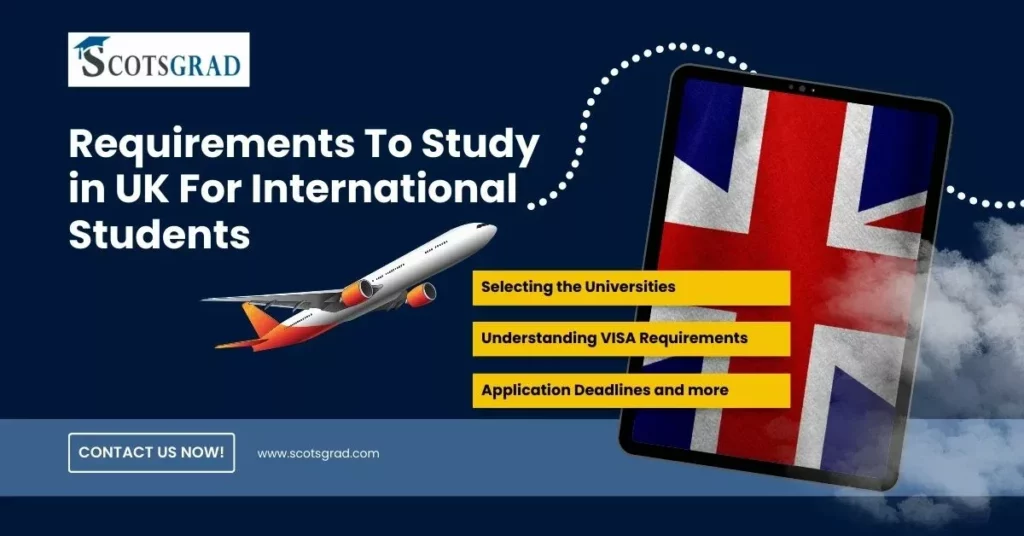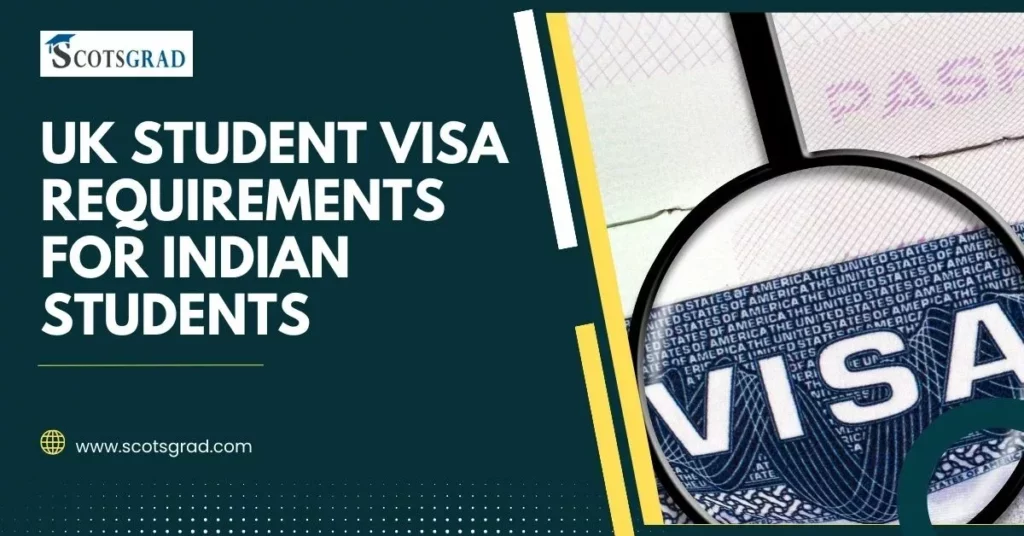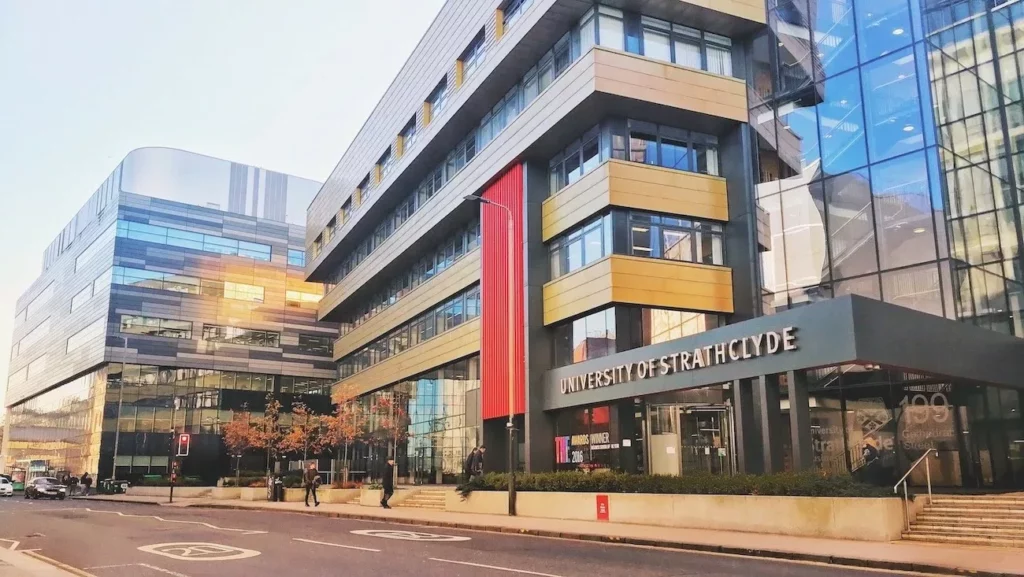Impressive student statistics show millions of students worldwide choosing European countries for their higher studies. Among these, the UK stands out as a premier destination for students seeking top-tier education in a vibrant and culturally rich environment. Renowned for prestigious universities and world-class medical institutions, the UK offers a wide range of courses across various disciplines and study levels. The UK’s education system is highly regarded globally, providing diverse study opportunities and convenient access to explore other European countries. The UK is an ideal destination for students seeking a transformative international education experience.
Requirements to study in the UK
The requirements for students vary across institutions and study levels. However, there are a wide range of programs to suit different academic backgrounds and career goals. The UK’s universities have varying requirements for students, typically including academic qualifications, English language proficiency, and sometimes, relevant work experience. Each university sets its own entry requirements, so it’s essential for students to carefully review and meet these criteria before applying. The below guidelines will help you in navigating the academic process, ensuring you meet all the criteria and maximize your chance of acceptance.
1. Finding the Right Course
Research and planning is the key to a successful application to study in the UK. It is never too early to start planning. To pursue master’s, you can start research as soon as you begin your final year of undergraduate study. If you are looking for undergraduate courses, you can begin in Grade XII as an Indian student.
Before you select a course of study, identify your field of interest and career aspirations. What works for others, might not work for you. So consider factors like your nationality, academic level, professional experience, and budget, and then select a program that aligns with your goals and skills. Once you have finalized the course, you can start looking into universities.
2. Selecting the University
Discover universities from official websites. Select and compare before making a final decision. Consider the below points to discover a suitable university:
- Does the university offer the right course options for you? Check the course structure, entry requirements, research, placement opportunities, etc.
- Does the department/school in the university rank well for the chosen course? Departmental/school rankings are far more crucial than University rankings.
- Check the teaching rankings and performance in research activities of the department/school that you wish to enroll in.
- Check professional recognition, student satisfaction, and employment statistics. Is your career prospect looking good to your expectations?
- Check the university location, course fees, and accommodation for international students.
- Check for Facilities like libraries and study spaces, and extra-curricular activities like sports and unions. Check for student and career support facilities.
Once you have finalized the course and identified universities of interest, it’s essential to thoroughly research the admission requirements for each institution and any additional requirements specific to your chosen course. Keeping in mind the budget and scholarship opportunities, select 4-6 good universities that you wish to apply for the particular course. If you have chosen the right course to apply for, then you can easily get an offer of acceptance.
3. Creating a timeline
Every university follows a timeline to get the admission steps completed without any hassle for millions of students. The website shows application deadline dates and applicable fees. The deadlines for international students are earlier than UK nationals, particularly for those international students who require a VISA. So it is best to start preparing at least 10-12 months before an Intake. There are majorly 2 intakes in the UK – in January & September. (Some universities also accept students in the Mid-intake – May/June). The availability of the courses varies with each intake.
All universities accept direct applications through their website for undergraduate, postgraduate and research programs. For undergraduate courses, the Universities and Colleges Admissions Service – (UCAS) accepts and processes the applications. Most universities accept UCAS applications, while some also accept direct applications for UG courses. Most of the UG courses are available in the September intake and very few are available in January in select universities.
4. Understanding VISA requirements
As an Indian student, you have to prove your Financial Capability for getting a VISA to study in the UK. You need to show that you can cover the cost of tuition fees and living expenses for the duration of your studies, either through personal funds, bank loans, or scholarships. Universities provide Nationality-based and Merit-based scholarships for eligible students. Also, financial aids are also available for needy students, further enhancing your study opportunities. Also, International students may need to arrange health insurance coverage while studying in the UK. So, keep all this in mind when planning your budget in the early stages of your research. Applying early can increase your chances of receiving financial assistance.
5. Drafting the Documents
Document preparation is the most crucial part of the application process. There are a few documents that need to be submitted as part of the application process for all levels of study. The most commonly required documents are :
- Curriculum Vitae
- Statement of Purpose
- Academic Transcripts
- Passport
- Letter of Reference
- Proof of English Proficiency
We will see in detail about each of them below. In addition to the above, some courses might require Work experience letters, portfolios, etc.
5.1 Curriculum Vitae
Curriculum Vitae (CV) is a summary of your academic and professional qualifications. It gives the first impression of you to the admission committee. Hence your CV should be well written. It should define your goals, achievements, and skills. Remember your CV is not your autobiography. It is only a summary of your academic qualifications and professional skills. From the view of the admissions team, your capability to handle the course will be a criterion for study in the UK.
5.2 Statement of Purpose
Also known as a Personal Statement or SOP, the document is mandatory and should be written by the student on their own. The information in your SOP is a reflection of yourself. It can be 500-100 words long depending on the requirements of the university. It generally elaborates on details like your study or work profile and interest in enroll in the university. Here are some key points to focus on when writing an SOP:
- About your personality and skills.
- Reason for applying for a particular course. How does it connect with your past and future plans?
- Reason for choosing the university. Elaborate on the factors that helped you decide on the course at that university.
- Reason for choosing the particular country for your study. How is it different from your home country?
- How do your education/work qualifications match the course you want to pursue? If they don’t match then show why you want to change subject areas.
- What are your career plans and how does this course fit your plan?
Refrain from including quotes, facts, and figures. Write your SOP like you are talking about who you are and what inspired you in an essay format of about 47 – 50 lines. The information in your SOP is important to process your application. Your SOP is likely to be your success in studying in the UK, so spend sufficient time in preparing this document.
5.3 Academic Transcripts & Grading System
To study in the UK most degree programmes are competitive. The grading system varies across study programs and levels. For Indian students applying to undergraduate study, the lowest academic record is 65% but some universities may expect a higher cut-off score for the humanities stream in Grade XII. A score of 70 – 80% and above for the Science/Commerce stream in Grade XII is necessary to gain admission into prestigious universities.
Indian Students with a low score in Grade XII, may not get selected for the undergraduate degree but may get into the Foundation programs. Once they successfully complete the program they can get admission to an undergraduate degree in the same university.
For postgraduate study, an undergraduate degree with a score of 60% is ideal for study in the UK although some universities may expect higher scores. A work-experienced candidate is always seen in a different light so it is ideal to ensure your CV incorporates all your work-related experiences, especially for courses like Business Analytics, Management, MBA, etc, For courses pertaining to Arts, Design, etc, sharing your detailed Portfolio will solidify your profile as a suitable candidate.
5.4 Letter of Reference
As part of the application process, a letter of reference or recommendation must be submitted from an academic / professional who knows you well. The reference letter should show outstanding talent in career goals and professional experience. The admission panel gets a comprehensive insight into your experience and achievements. Generally, 2 letters of reference are required.
It is important to pick the right person to give you an LOR. The person should have known you at least for 6 months. Below is a list of people you can request a LOR according to the course studied earlier.
| UG Applicants | High School Teachers, Counsellors or Principal |
| PG Applicants | College Professors, HODs. Intern Supervisors. |
| PG Applicants with experience | College Professors, HODs. Intern Supervisors. Previous/Current employers. |
| MBA Applicants with more than 3 years of experience | Professionals like Managers – Current and Previous employers. |
| Ph.D. Aspirants | Recent graduates – ask from College Professors, Project Guides |
Content for Letter of Recommendation.
A letter of recommendation is a formal letter written on the Institution’s Letterhead. A typical reference letter is about one page long. The letter should include 4 main points:
- A paragraph to Introduce how they know the applicant
- Main content – Emphasis on why they think you are the best for the program. Focus on educational skills, relevant personality traits, applicant’s academic achievements, and voluntary activities during the course.
- Closing lines to conclude with assertive statements and reasons for recommending the applicant. Why are you a good fit for the course and university?
- End with Name, Contact details, and signature with the seal of College/Place of Business.
Overall, a strong letter of recommendation can greatly enhance your university application by providing additional context and insight into your qualifications and potential for success
5.5 Proof of English Proficiency
English language skills are important to study in the UK. It helps to communicate and interact with professors and fellow students. Also, to read course material and write essays and succeed in completing the course. Applicants with non-English speaking backgrounds like an Indian students are required to take English Language Tests like IELTS (International English Language Testing System), TOEFL(Test of English as a Foreign Language), PTE(Pearson Test of English), etc. These tests assess the Reading, Writing, Listening, and Speaking skills of the student. They are a way of ensuring you are ready for international education in the UK.
If you have studied in English-speaking institutions for a certain period you might get an exception from these tests. Also, some universities may accept the English Score of the Standard 12 examination for Indian students. You can make an application without English Language scores. Universities will give you a conditional offer if they want you to meet the English language skills.
So, if you wish to, you can apply without the IELTS score and later meet the condition. Remember that preparing for the test, writing, and getting the results can take nearly 2-3 months to complete. So plan accordingly.
Application Submission
Draft the documents as highlighted above and submit the applications before the deadline. Once you have submitted, start exploring scholarships, loans, and budgeting for expenses. Sometimes you might need to submit a Scholarship essay as part of the scholarship form.
Begin the process for obtaining a student VISA and prepare the required documents like Tuberculosis Testing, Proof of Funds, ATAS (Academic Technology Approval Scheme), etc. Remember that you can apply for a VISA only after getting an Unconditional offer, Paying a Deposit, and getting a Confirmation of Acceptance of Studies (CAS).
University Interviews
Interviews are sometimes required as a filtering mechanism when seats are insufficient for very popular courses. The interview helps to determine deserving students. It checks to see if your communication skills meet the admissions panel requirements. It can also be on the academic capability to understand your motivation and goal for your course.
The university’s admissions office will schedule the interview via email. This could be before or after issuing a conditional offer letter. The interview will happen online over a video call or rarely telephone call. Prepare for the interview with genuine answers. Speak with clear intentions of your intention to study.
Overall, the UK’s comprehensive support system and welcoming environment make it a destination country for the student community worldwide. Talk to Alumni and current students to understand the requirements to study in the UK as an international student. They can offer firsthand experiences and advice on navigating visa requirements, securing accommodations, and adjusting to student life in the UK. Additionally, attending university fairs and information sessions hosted by UK universities can provide detailed information and clarify any doubts regarding the application process.
ScotsGrad is with you to help pursue your interests in studying in the UK. With over 30 UK Alumni as mentors, our counseling sessions will help bring clarity to your decisions and help you achieve your dream of studying in the UK. Our dedicated team will ensure a smooth application and VISA process. Contact our team at ScotsGrad to build your career in the UK.
FAQS:
I am currently pursuing my final year and have yet to receive my Academic Transcripts and degree Certificates. Can I apply?
Yes, you can apply. You will be given a conditional offer. If you are in Grade XII, applying for a UG course, you can apply with your Grade X and Grade XII marksheets. Some universities will request Predicted Scores, you can get the same from your school and apply. If you are a Final year UG student, you can apply with your Grade XII and UG Interim Transcripts / Provisional Certificate. Once you graduate, you can share the rest of the Transcripts and Degree certificates before the start of the course.
Can a fellow student or my colleague write my letter of recommendation?
No. Only an academic faculty or Manager or any higher official under whom you are employed and who knows you can give an LOR. A person in the same level as you cannot give a letter of recommendation.
What should I do if I cannot produce a Letter of recommendation?
If you are not able to submit a letter of reference, you can furnish the referee details as part of your application. The referee details include the Name of the referee, the Name of the Institution with address, the Position they hold, Email & Phone Number. The university will request a letter directly from the referee via email. The referee can follow the instructions given in the email and submit a letter of recommendation.
Can I apply to UK universities without a passport?
Some universities allow you to make an application without a passport. But ensure that you apply and receive your passport before you get an offer. A passport is necessary to get an Unconditional offer and get CAS – Confirmation of Acceptance of Studies.
Can I copy my friend’s Personal Statement?
A personal statement is meant to reflect your own experiences, interests, and aspirations. Using someone else’s work as your own is considered plagiarism and can have serious consequences, including rejection of your application. You can get advice from others but the SOP should be your own work.
What is an ATAS?
ATAS is a clearance certificate required for International students, applying for sensitive PG courses like nuclear technology, aerospace, biological sciences, etc. If you require an ATAS (Academic Technology Approval Scheme), it will be mentioned in your CAS. You could also refer to the course page on the university website. Such applicants need to obtain an ATAS certificate before applying for their student visa.
Should I take an English Test like IELTS, or TOEFL, when I can get a waiver?
Yes. Writing an English Test will provide a holistic view of your language skills and demonstrate your readiness to study in an English-speaking environment. Moreover, it will prove your dedication to meet the standards, which is advantageous when seeking job opportunities.
Book A FREE Call with Alumni Mentor

Looking to Study in UK ?
Book a Free CAll with Alumni Mentor Today



